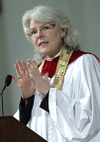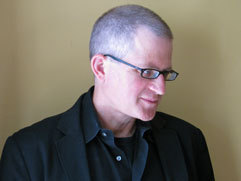Isaiah and Jesus:
Critical Dissent as a Form of Faith
For Sunday February 9, 2014
Lectionary Readings (Revised Common Lectionary, Year A)
Isaiah 58:1–12
Psalm 112
1 Corinthians 2:1–16
Matthew 5:13–20
A few months ago at a barbecue, a friend described to me his ambivalent history of church attendance. Daniel grew up on a farm in the Midwest in a Christian family. He attended church on Sundays, and graduated from a Christian college. He described those years with fondness and respect.
His ambivalence began when he took a course on the critique of religion — at the Christian college.
In the first part of the course, the class read external critiques of religion by outsiders like Darwin, Marx and Freud. Their contemporary kin would include atheists like Dawkins and Dennett, Harris and Hitchens.
Insiders should welcome the outsider's critique. When you're committed to a cause — whether religion, politics, economics, or almost anything, it's always easy to ignore your weaknesses. To spurn criticism is a recipe for disaster.
 |
Joan Chittister. |
In the second part of the course, Daniel's class read the internal critiques of religion by its insiders. This tradition begins — surprise! — in the Bible itself, with texts like Isaiah 58 and Matthew 5 from this week's lectionary. Such critical dissent as a form of faith, epitomized in Jesus's engagement with Judaism, enjoys a long history in the church.
The internal critiques by insiders added a twist to Daniel's ambivalent relationship with the church. He was a gifted intellectual who did a PhD at Harvard, so he took the external critiques of religion seriously. But maybe, he began to think, there's a vibrant sort of faith and faithfulness that encourages dissent from the inside out. The gift of the insider is the combination of commitment with criticism.
The Protestant Reformation that tore through Europe and transformed western society began as an insider critique of our medieval inheritance. Thus did the monk-turned-professor Martin Luther offer what the Oxford historian Diarmaid MacCulloch calls a "spectacularly disloyal form of loyalty to the church" when he demanded radical reform.
Yes, it was a period of "extreme mental and physical violence," says MacCulloch, but in the end toleration and peaceful co-existence resulted. The putative divine right of hereditary and state powers succumbed to rule of law and the voices of citizens. Individual conscience usurped institutional coercion. The reformation spawned a historical way of thinking from which we benefit today.
All this because of what MacCulloch calls "a remarkable exercise in honest thinking." And for all its faults and unintended consequences, consider that eastern Orthodox Christianity and Islam have not experienced a similar reformation that was kick-started by insider criticism.
 |
|
Barbara Brown Taylor. |
In her book Called To Question (2004), the Benedictine Joan Chittister explores the relationship between personal conscience, intellectual integrity, and church fidelity. Like every institution, the church asks us, at some level, to sublimate our personal identities to the group identity. But when we do that we risk forfeiting our conscience and distorting our faith. We become what Chittister calls "institutional robots."
Some people try to change the institution. But critical questions are precisely what the church often suppresses, or deflects with superficial answers. And it's easy to acquiesce to the institutional defaults, perhaps out of fatigue, fear of being wrong, or the possibility of punishment. Others just leave out of frustration.
Chittister combines critical inquiry with institutional fidelity — she calls herself a "loyal member of a dysfunctional family."
Then there's Barbara Brown Taylor and her book Leaving Church: A Memoir of Faith (2006). Taylor explores the relationship between her personal identity and the professional institution that she loves and serves as an Episcopal priest.
With admirable candor she describes complex issues that are both personal and clerical. Genuine faith, she says, includes "both a center and an edge; each is necessary for the soul's health." To nourish the center, feed the fringes. In the end, Taylor left the church to save her faith.
Isaiah 58 is a classic insider critique. The people of God "seem eager to know God's ways," writes Isaiah. As evidence of their faith, they appeal to their fasts.
But Isaiah dissents — a privatized religious fast that ignores public ethics like economic exploitation is bad faith. A "true fast," says Isaiah, "looses the chains of injustice, sets the oppressed free, feeds the hungry, clothes the naked, and shelters the wanderer."
Many of his critics complained that Jesus ignored Jewish laws, and even wanted to destroy the temple. In some ways that's true.
In Matthew 5 Jesus rebuts these criticisms. He says that he didn't come to abolish but to fulfill the law. He then gives five examples, each of which is introduced with the formula "you have heard it said," and then contrasted with "but I say to you."
He picks up where Isaiah left off and goes even further. External compliance with a religious code isn't enough, said Jesus; there's a deeper level of interior transformation. Anger is more subtle than murder, and lust more nuanced than adultery.
 |
Christian Wiman. |
In his memoir My Bright Abyss; Meditation of a Modern Believer (2013), the poet Christian Wiman of Yale wonders what assenting to his long latent faith might mean — especially after being diagnosed with a rare form of cancer on his thirty-ninth birthday.
"What I crave now is some speech that is true to the transcendent nature of grace yet equal to the hard reality in which daily faith operates." He seeks that elusive balance between "active devotion and honest modern consciousness." He keeps working "to see the sanity and vitality of this strange, ancient thing" called Christian faith.
Dissent is not disloyalty. Vibrant faith demands critical vigilance, especially from its own insiders.
A friend who's a professor of history and an Episcopal priest says that the church is "exactly like family — you understand what you can get and what you can't, and that blood is indeed thicker than water." Families can be places of unconditional love. But none of them are perfect or beyond criticism. In either case, we remain faithful to our family.
For further reflection:
* Consider the examples of other "dissident disciples" like Kierkegaard, Dorothy Day, the Berrigans, Martin Luther King, Jr., and Wendell Berry.
* Labels can be libels, especially when we define who's an insider or outsider. See Frank Anthony Spina, The Faith of the Outsider; Exclusion and Inclusion in the Biblical Story (2005). Spina explores seven stories where the outsider is mainlined and the insider is marginalized.
* See Robert Inchausti, Subversive Orthodoxy; Outlaws, Revolutionaries, and Other Christians in Disguise (2005). Inchausti explores the cultural critiques of twenty thinkers who, despite their many differences, all took great exception to the received wisdom of their day.
Image credits: (1) Benetvision; (2) Prodigal Kiwi(s) Blog; and (3) Yale Alumni Magazine.





